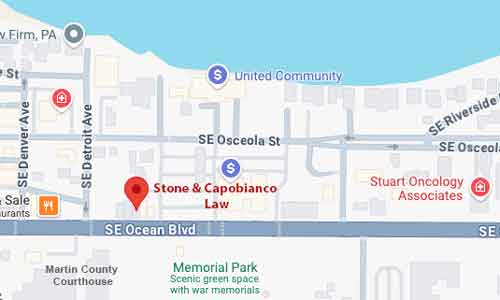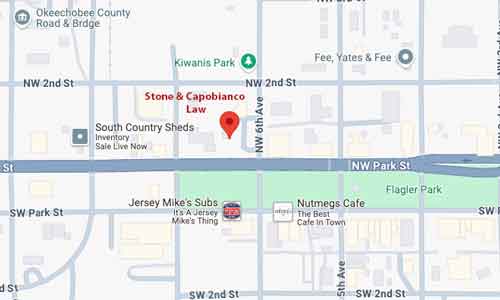Criminal Case Procedure
Thank you for choosing the Law Offices of Stone & Capobianco, P.L. to represent your interest in this case. Since you probably do not know what to expect, we would like to give general information about the criminal justice system and how we handle criminal cases. We feel this will be helpful to you and to ourselves. One of the most difficult requests we must make of you is to have patience.
When you are first interviewed, general information regarding the incident is obtained. The State Attorney’s Office and Clerk of Court will also be notified by our office that you have retained us as your attorneys. All communication between you and our office are confidential. Conversations with other people are NOT confidential. DO NOT UNDER ANY CIRCUMSTANCE DISCUSS YOUR CASE WITH ANYONE, EXCEPT MEMBERS OF THIS OFFICE.
First Appearance or Arraignment: A person who is arrested and does not immediately bond out will be given a First Appearance Hearing within 24 hours of arrest. At this hearing, the judge will advise the person of their charges and determine if there is probable cause to detain them. The Judge will also set an arraignment date. If you bonded out before the First Appearance hearing you may have received a court date from your bail bondsman or from the clerk’s office. This generally is your arraignment date. The Arraignment is a day to advise the Court how someone pleads to their charges. The usual pleas are guilty, not guilty, and no contest. A not guilty plea is entered when the case needs to be set for trial and/or more time is needed to investigate the case. If a guilty or no contest plea is entered, the case will proceed to sentencing.
If you retain our office prior to your arraignment date, you will not be required to attend court on that date. Our office will file a document on your behalf, advising the court that we are representing you. Please note that while our office has waved your attendance at arraignment, we do not, in fact, appear in court on that date. We are making an “appearance on paper” for you. Therefore, there is nothing to report on, relative to the arraignment date.
Docket Call: If a not guilty plea is entered at Arraignment, the next court date is usually a Docket Call. At the docket call, please can usually be entered, and cases can be set for trial. At docket call the Judge is checking the status of your case and we will inform the Judge that your case will be a change of plea, is ready for trial or request for a continuance.
Discovery: Having to go to court is hard enough, but the waiting can be even worse. When you entered into an agreement with our office regarding your representation, we filed several documents with the court. One of the documents is a “Demand for Discovery” requesting the state to provide us with the information that they have in their case file on your criminal matter. The State’s response, combined with the time that we can pick up such information, typically takes thirty days – sometimes even longer – from the date that we file the “Demand for Discovery” on your behalf. In some circumstances, the discovery may come from outside sources, such as driving records, criminal histories and videotapes, etc. which may cause even further delay.
Accordingly, during that time we are waiting for discovery, we will not be able to provide you with any new or additional information regarding your case. It is essential that we have your cooperation in helping us gather facts about your case. Please inform us of anything you think has a bearing on the case. When our office receives the State’s information, we will review it and schedule a time for you to meet with us to discuss your case and the new information.
Motions: Various motions may be filed in a case if we determine it is legally appropriate. Such motions may include a motion to suppress, motion for bond reduction or other legal matters that need to be addressed by the Court. When you are represented by a lawyer, you should not file your own motions and should discuss this issue with our office.
Plea Offers: Our number one goal is to have the criminal charges against you dismissed, if possible. Should the case not be dismissed, we will pursue a reduction of the charge(s) and/or a plea without jail time.
If a plea of guilty or no contest is entered, or if the jury returns a verdict of guilty, the next step in your case will be Sentencing. At the sentencing, the judge determines what punishment should be given. Some options for punishment include jail, prison, probation, fines or programs that may assist people who have mental health, substance or other problems.
Remember you should always be respectful to the judge and court personnel. Remember your level of respect and courtesy will be noticed. Be on time because if you are late, a warrant for your arrest could be issued. Dress appropriately, no shorts, tank tops, t-shirts or sandals. When speaking to the judge, always be polite.
Jury Trial Date: If your case is not resolved by a plea or dismissal your case will be set for a trial. You will need to attend court on that day so please make arrangement to be there. Most cases that proceed to trial begin with jury selection. After a jury is selected, the attorneys can make arguments to the jury and introduce evidence. The jury determines whether the verdict will be guilty or not guilty. The few weeks before the trial date is spent in detailed preparation of your case. Everything that is expected of you will be explained to you in detail well in advance of you going into the courtroom.
Our office is here to assist you in every way possible, therefore we urge you to keep in contact with us. If you move, change your telephone numbers or know that your scheduled court date is going to conflict with another matter, you MUST NOTIFY OUR OFFICE IMMEDIATELY. Please understand, for a postponement, or a continuance to be granted, a judge must rule on the matter. Therefore, please plan on attending court on the required date until such time that the court, or our office has officially notified you that your case has been continued.
Questions or Concerns: To achieve any of the above, considerable time, research and negotiating must be done. Accordingly, while it is our wish to provide you with the above, in a timely manner, the practical reality is that we may not have an answer to the resolution of your matter until we are close to your trial date. Given that the State Attorney is handling dockets of several hundred cases, he may not be able to provide you with a “plea offer” until late in the game. Sometimes offers are not extended until the eve, weekend or day of the trial. Please, rest assured that our office is doing everything possible to speed up the process without compromising your case.
Phone Calls: Our office makes every effort to return telephone calls in a timely manner. When we are out of the office or closed for the day – the answering service or our voice mail will take your message. Many times, our staff retrieves messages from outside the office, therefore, you will need to leave a telephone number for our office to reach you, regardless of whether you have previously given that information to our office staff. If you are incarcerated and calling the office collect, please be aware that unless your attorney is in the office to take your call or has previously instructed staff to accept the call, then the call will not be accepted.
Our Attorneys spend many hours in court, negotiating with the State, researching new issues, drafting legal documents and returning phone calls. As such, our staff can adequately handle non-legal questions you might have. PLEASE NOTE: Only our Attorneys can provide you with legal advice; not our staff or answering service.
Hearing Dates: Our office will receive from the Court a copy of the Notice to Appear for your scheduled hearings. Unless otherwise instructed by the Court or this office, your attendance at all hearings is mandatory. We will contact you by phone the day before as a reminder of your required attendance. Additionally, we may have occasion to mail you copies of documents related to your case. Therefore, it is your responsibility to ensure that our office has your most current phone numbers and address. WITHOUT THIS INFORMATION YOU RISK FAILING TO APPEAR, WHICH COULD RESULT IN THE ISSUANCE OF A BENCH WARRANT FOR YOUR ARREST.
Information on Misdemeanor Charges: Misdemeanors are less severe than felonies and are further divided by degree. Misdemeanors of the second degree may be punished by a statutory maximum of up to 60 days in county jail; first degree misdemeanors may be punished by up to a year in county jail. A court may also impose probationary sentences for misdemeanors up to the statutory maximum for the offense. Punishment for a second-degree misdemeanor thus can include up to six months’ probation, while for a first-degree probation it can be up to a year of probation. The court can also combine incarceration with probation.
Information on Felony Charges: Felonies are more serious than a misdemeanor, are also divided by degree and punishable by state imprisonment for more than one year or death and classified as capital or life felonies, or felonies of the first, second, or third degree. Third degree may be punished by a statutory maximum of up to 5 years in prison jail: second degree felonies
Capital and Life Felonies are the most serious crimes in Florida. Capital felonies are punishable by the death penalty or life in prison without the possibility of parole. First degree murder is an example of a capital felony. Life felonies are punishable by life imprisonment and a fine of up to $15,000. Fla. Stat. §§ 775.082, 775.083.
Felonies of the First Degree are usually punishable by up to 30 years in prison and a fine of up to $10,000. Fla. Stat. §§ 775.082, 775.083.
Felonies of the Second Degree can result in a prison term of up to 15 years and a fine of not more than $10,000. Fla. Stat. §§ 775.082, 775.083.
Felonies of the Third Degree are the least serious types of felonies in Florida, punishable by up to five years in prison and a fine of up to $5,000. Fla. Stat. §§ 775.081, 775.082, 775.083.
Prior Felony Convictions People in Florida who have previously been convicted of two or more felonies and are convicted of, yet another felony may be sentenced to a lengthy prison term under one of Florida’s recidivist sentencing schemes. Fla. Stat. § 775.084.
Statutes of Limitations For most crimes, the state must begin criminal prosecution within a set period, called the statute of limitations. The statute of limitations begins to “run” when the defendant commits the crime. In Florida, capital felonies, life felonies, and felonies that resulted in death have no statutes of limitations. Felonies of the first degree typically have a four-year statute of limitations, while other felonies generally have a limitation period of three years. Fla. Stat. § 775.15.



